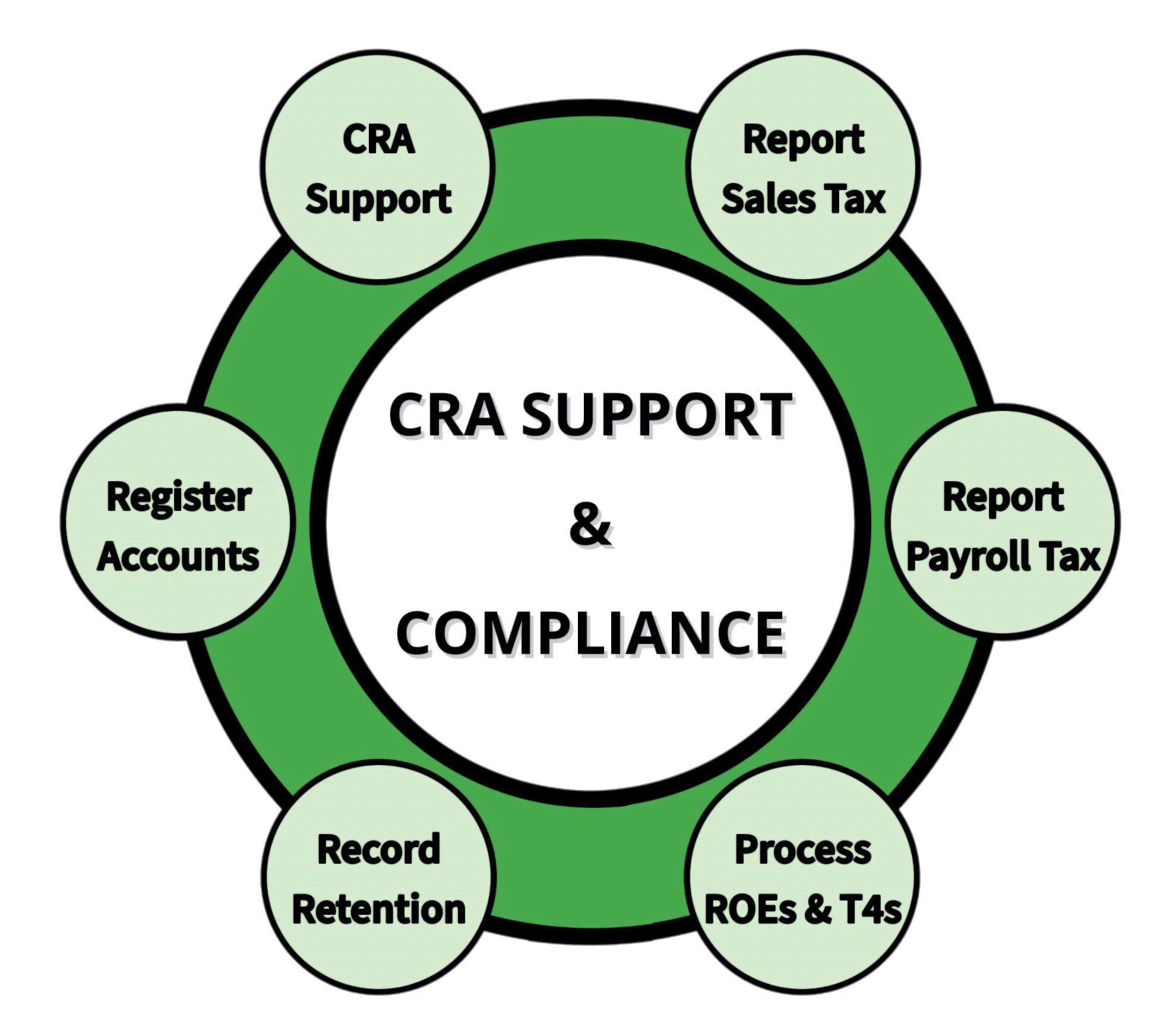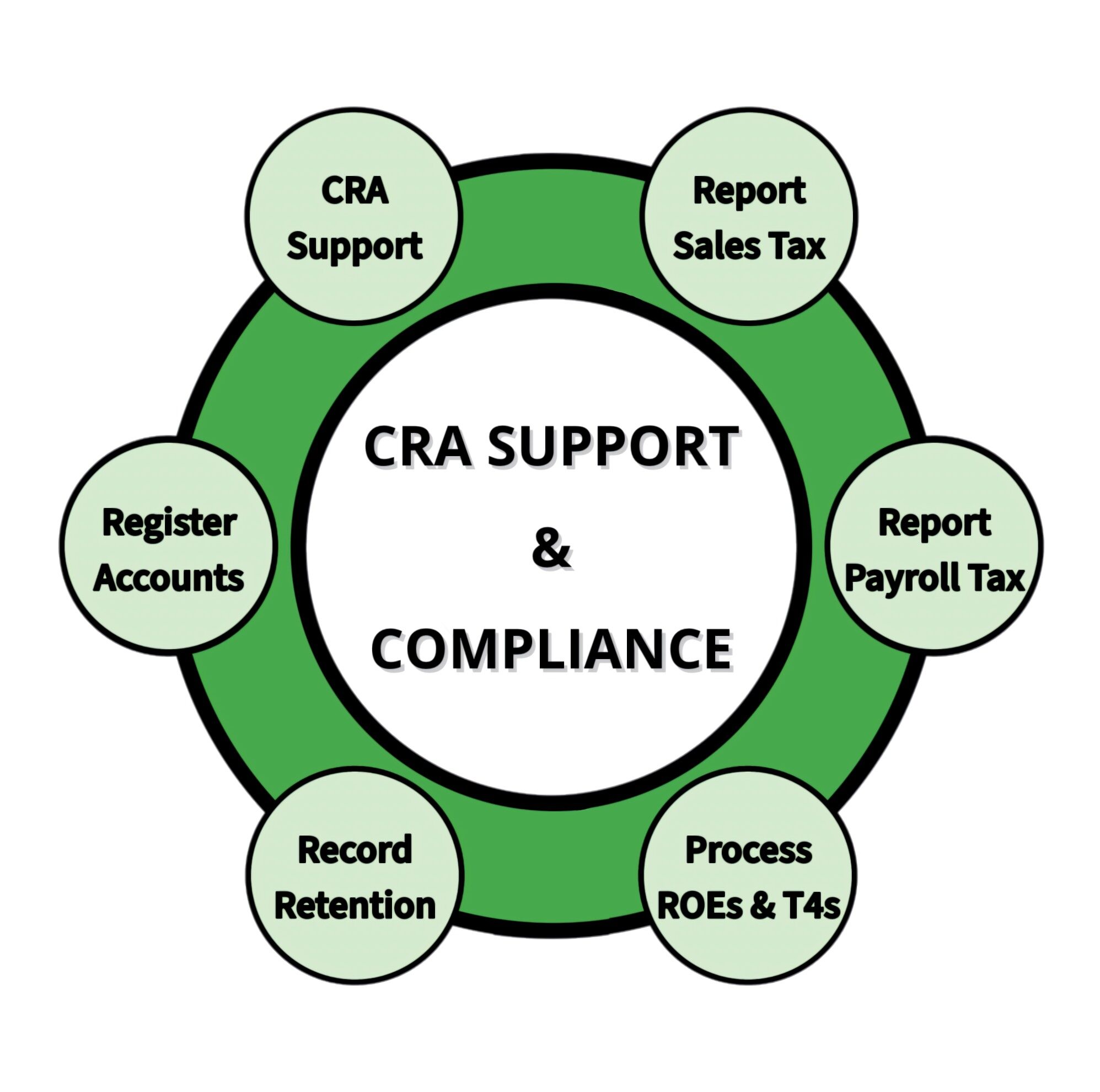LET US HELP YOUR BUSINESS STAY COMPLIANT AND YOU STRESS FREE
We handle many of your compliance needs, from Sales Tax Filings to Payroll Taxes, and we help your business meet CRA requirements. We also provide CRA representation and often recommend it, which allows us to call CRA on your behalf and file right from your business account!

Things We Need…
For us to do our job properly, we need to receive your business documents in a timely manner.
Client-Provided Documents
Getting ALL your business documents in a timely manner is crucial to our process and to meet deadlines. To journalize your transactions with precision, we need to review these documents.
Accountant Adjustments
To keep your books complete, we must receive and journalize all adjustments made by your Accountant for Year-End & Income Tax. This is necessary before we close the year.
…Things We Do…
We work with you to keep your books compliant with CRA requirements!
Our Client-Based Approach
When it comes to compliance and Filing with CRA, we only perform the duties given to us! Although we are capable, you may want to handle certain things yourself or have your Accountant do it!
Included in Full-Service Bookkeeping
Our Compliance and Filing Services are included in our Full-Service Bookkeeping Package as a part of the fiscal cycle. Of course, certain tasks are performed upon request!

We provide CRA support through authorized access via the ‘Represent a Client’ portal. This allows us to communicate with CRA on your behalf when needed, review account information, and handle filings directly in your business account. We recommend this approach to simplify things and make everyone’s lives easier.
…Why It’s Important
CRA COMPLIANCE MATTERS
Maintaining CRA compliance isn’t just a regulatory requirement—it’s essential for protecting your business from financial penalties, interest, audits, and operational disruptions.
Handling these tasks yourself can be overwhelming and frustrating. Outsourcing some of the burden to us frees you to focus on what you do best!
We Solve The Puzzle So You Don’t Have To!
f.a.q.
You have questions. wE have answers.
Maintaining CRA compliance through proper record-keeping is essential for Canadian businesses, as it ensures adherence to regulations, supports accurate tax filings, identifies income sources, and aids in decisions related to GST/HST ITCs. Records that you must retain include, but are not limited to:
Financial and Accounting Documents: Keep all sales invoices, receipts for purchases and expenses, bank statements, cancelled cheques, and duplicate deposit slips.
Payroll Records: Keep all employee contracts, timesheets, remittance details, and related documents.
Tax-Related Documents: Keep all tax returns, supporting evidence for income, credits, exemptions, and deductions
Separation and Accessibility: Maintain separate records for each business operated that are easily verifiable and accessible.
Retention Periods: Keep records for at least six years from the end of the relevant tax year, with extensions for audits, objections, real estate transactions, or indefinite carry-forward items. Not all records may be discarded.
Yes, we highly recommend that you register a separate bank account for your business to keep your personal and business activities distinctly apart, ensuring a complete and accurate ledger of your business transactions.
This separation helps to simplify the bookkeeping process by providing a dedicated record of your income, expenses, and cash flow that can be reconciled against your books, without having to exclude personal expenditures. Overall, this practice enhances financial clarity and professionalism.
Sales tax in Canada includes federal and provincial types like GST (Goods and Services Tax), HST (Harmonized Sales Tax), QST (Quebec Sales Tax), and PST (Provincial Sales Tax). It’s a consumption tax applied to most goods and services, which registered businesses must collect from customers and remit to the appropriate authorities. If your business’s taxable revenues exceed the provincial threshold, registration is typically required, allowing you to claim Input Tax Credits (ITCs). ITCs let you recover the sales tax paid on business-related inputs (where applicable), such as supplies or equipment, provided you maintain proper records.



